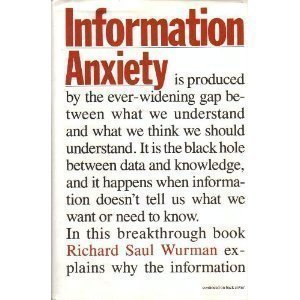By Richard Saul Wurman. Bantam Books. 1989
Chapter 1: The Non-information Explosion
Information is not knowledge. You can mass-produce raw data and incredible quantities of facts and figures. You cannot mass-produce knowledge, which is created by individual minds, drawing on individual experience, separating the significant from the irrelevant, making value judgments.
— Theodore Roszak, author of The Cult of Information, quoted in This World (5/24/87)
Chapter 11: News Information: Violent Wallpaper
Too much mass media tends to have a narcotizing effect on society, which is lulled into complacency by thinking that being informed is an end in itself and forgets that being informed has no relationship to taking action. According to Reed Blake and Edwin Haroldsen in ‘A Taxonomy of Concepts in Communication’, large segments of the population of this country could be labeled as ‘informed but inert,’ having been bombarded into a stupor by the continuous stream from radio, television, newspapers, books, and films.
Or, as Philippe Auguste Villiers put it more succinctly, ‘I have thought too much to stoop to action.’
This wallpaper doesn’t advance your knowledge of the world or your day. It doesn’t inform; it is not memorable. Yet we are weighed down by this litany of violence.
Crimes and wars are no more representative of news than wars are representative of history. Both make up only an infinitesimal percentage of what is happening or has happened. Yet because bad news has an urgency about it that endows it with the shine of timeliness, it preempts other events, the stories with heart and value that could advance your understanding of the world, make you a more valuable citizen, inform you so you could participate in real issues. Another crash on the highway or another mugging is not news that has to be delivered. There is not an appreciable difference between one car accident and another, between one fire and the next.
News programs without the violent wallpaper could be forums for stories of events, people, positions, and ideas.
Basing your view of the world on these isolated events is like basing your knowledge of music on what you hear on the elevator. Cluttering your thoughts with events like these inhibits your ability to discern the news that might somehow concern us.
I’d much rather read an article in the papers about a breakthrough in the way things are done rather than another recital of the status quo.
Crime stories and sensationalism are not necessarily what people find interesting in the news, yet this is what comprises news programs. They become simply violent wallpaper.

